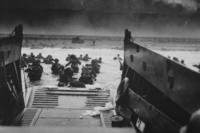It may not come as a surprise that Oliver Stone, the rabble-rousing film director and writer behind Oscar-winning war movies such as "Platoon" (1986) and "Born on the Fourth of July" (1989) was once a grunt in the U.S. Army. What may surprise you is that he received the Bronze Star and Purple Heart for his services in the Vietnam War.
Born in New York City to a conservative family, Stone spent one year at Yale University before dropping out in 1965 and living the rootless life many of the "Easy Rider" generation lived during that era. He taught English in Vietnam and lived briefly in Mexico while wrestling with a novel that would go unpublished until 1997 ("A Child's Night's Dream").
Unable to find a publisher, and without direction in life, Stone joined the U.S. Army in April 1967, specifically requesting combat duty. Of his decision to join the military, he said: "I thought war was it; it was the most difficult thing a young man could go through. ... It was a rite of passage. And I knew it would be the only war of my generation, so I said, 'I've gotta get over there fast, because it's going to be over.'
"There was also a heavy streak of rebelliousness in the face of my father, and I think I was trying to prove to him that I was a man, not a boy."
After basic training, Stone landed in Vietnam on Sept. 16, 1967, and was assigned to the 2nd Platoon of Bravo Company, 3rd Battalion, 25th infantry, stationed near the Cambodian border. He was wounded twice in action and later transferred to 1st Cavalry and assigned to a Long Range Reconnaissance Platoon in April 1968.
It was during this time that Stone met Juan Angel Elias, who would become the inspiration for Sgt. Elias (Willem Dafoe) in "Platoon," which drew heavily on Stone's Vietnam experiences. Stone was discharged in November 1968 after 15 months of duty and received two personal awards: the Bronze Star with "V" device, which he received after conducting "extraordinary acts of courage under fire," and a Purple Heart with one Oak Leaf Cluster.
Related: To create a personalized transition plan for yourself, and for transition guides and checklists, visit the Military.com Transition Center.
Emotionally scarred by his experiences in Vietnam, Stone returned to the U.S. "very mixed up, very paranoid and very alienated," in his words. Fortunately, the GI Bill helped him enroll in New York University, where he studied under master filmmaker Martin Scorcese and gained a new focus in life.
Stone broke into Hollywood as a screenwriter, with his Oscar-winning screenplay for "Midnight Express" (1978) establishing him as a tough-minded scribe who pulled no punches. He brought this same intensity to his scripts for "Conan the Barbarian" (1982) and "Scarface" (1983) and his career-changing directorial job on "Platoon," which earned him an Academy Award for best director.
Always opinionated (he has been celebrated and criticized for his liberal views) and willing to push boundaries, Stone followed "Platoon" with acclaimed films such as "Wall Street" (1987) and "Born on the Fourth of July," as well as controversial ones such as "JFK" (1991) and "Natural Born Killers" (1994).
Comparing his films to his life, Stone said: "'Platoon' would be more of the character I was, just shaken up. 'Born on the Fourth of July' would be the character I was a few years later. I became more radical because I learned more and my perception of what we were doing in the world was changing."
Want to Learn About More Famous Veterans?
Whether you want to learn more about other famous veterans, polish up your resume, find veteran job fairs in your area, or connect with employers looking to hire veterans, Military.com can help. Sign up for a free Military.com membership to have job postings, guides and advice, and more delivered directly to your inbox.











